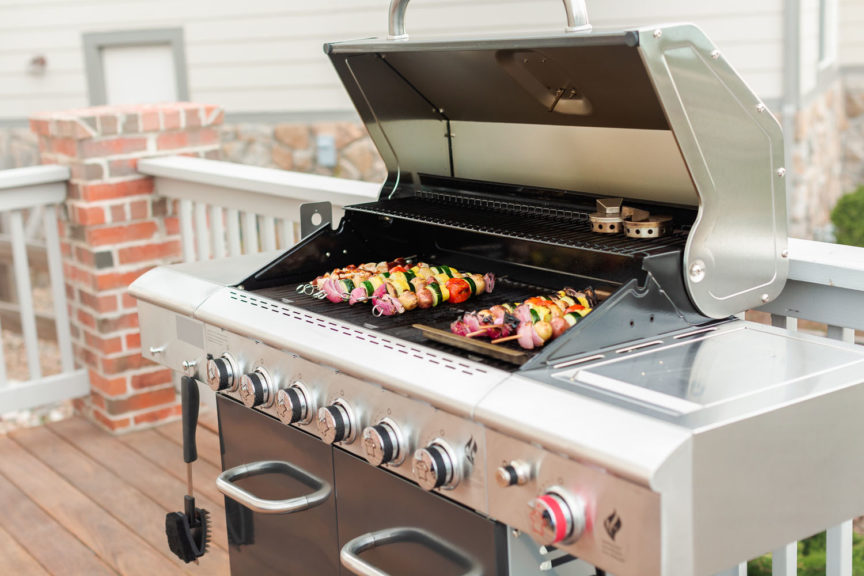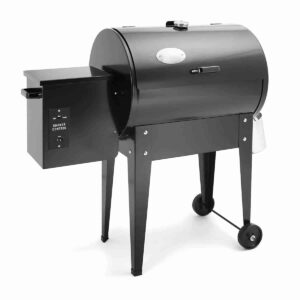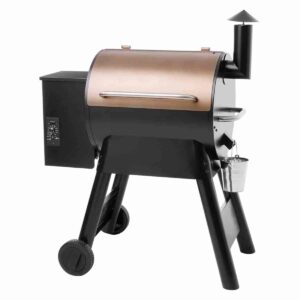There are a lot of activities you could consider to be in the running for the great American pastime. Baseball held the title for years and football in recent years has overtaken baseball as the most watched sport in all American sports. Throughout it all, putting delicious burgers, steaks or chicken on the grill has kept pace and continued as a tradition.
75 percent of Americans own an outdoor grill or smoker. We love to eat and we love it’s straight off the barbie!!
Backyard barbecues are a huge part of American culture and the focus of several major holidays. Summer is fast approaching and now is the time to get your grill ready for this grilling season.
If you are new to grilling, you might be wondering what type of grill to purchase. The two most common types of grills are natural gas grills and propane grills.
Keep reading for more information on grilling for beginners and stick with us as we cover the pros and cons of each type of grill recommended below.
Grilling for Beginners
When it comes to backyard grilling you have two main choices:
Both of these barbecue types are great, but it’s likely that one will work better for your individual needs than the other.
They each have their pros and cons and can differ when it comes to cost. In this article we are going to focus in on propane and natural gas. If you consider yourself a newbie or just want to brush up on your knowledge, heck out our article on Charcoal Grilling Basics Here.
Keep reading for more about propane and natural gas and the pros and cons of each.

Propane vs. Natural Gas
While propane and natural gas are both forms of gas, they are really quite different.
Natural gas primarily refers to methane gas. Propane is technically liquid propane gas. Natural gas is supplied through your main connection and propane is supplied via a tank or bottle.
Propane
Propane or liquid propane gas is comprised of butane, isobutane, and propane that is liquefied through pressurization.
Propane is supplied via a tank, so you can take the party anywhere. If you are looking for portability, propane may be your better bet. You can take your smoker or barbecue anywhere and just hook up your propane tank.
Purchasing refill tanks is easy too as they are available at any gas station.
Pros
- One of the biggest pros of having a propane grill is its portability.
- You can move your grill around your property as you desire and can even take it with you wherever you go. It’s easy to detach and transport a propane tank as well.
- If you are looking for convenience, propane might be right for you.
- If you are concerned about the environment, you may want to choose a propane grill.
- Propane does not contain lead and is, therefore, more environmentally friendly. It also produces lower greenhouse gas and produces water vapor and carbon dioxide, which are naturally occurring.
Cons
- Propane is usually more expensive than natural gas. It also has to be transported and stored.
- Propane can create what is called a wet heat, which can change the texture of your food.
- Propane also lingers in the air for longer periods of time than natural gas, which disperses quickly. Natural gas is lighter than air.
Natural Gas
Natural gas is supplied by your utility company and directly piped to your house.
Initially, the gas is removed from the ground. It initially contains ethane, butane, pentane, and pentanes plus, but these other gasses are removed and repurposed before the methane gas is piped to you.
Hooking up your grill to natural gas is easy. You simply connect your grill to the gas pipe. Unlike propane, natural gas is not portable. Once you hook up your grill, you can’t move it.
Pros
- The biggest pro of using natural gas is that you have an endless supply right at your own home. You will never have to worry about running out of gas in the middle of grilling.
- Natural gas is theoretically cheaper than propane, coming in at about 1/6 of the price of using propane (more on this later).
Cons
- Hooking up a natural gas grill can be a pain. You will likely need assistance from a gas professional to install it at your home.
- Once you install your natural gas grill, you cannot move it. You cannot take it with you and cannot move it to another location in your yard. However, if you do not see yourself needing to move your grill, this might not be an issue for you.
- If you are not already connected to the natural gas mains, you may have to pay to get connected.
Which is Hotter?
The simple answer is that propane burns hotter than natural gas.
Assuming you are burning the gas at an outside air temperature of approximately 68 degrees Fahrenheit, propane will burn 42 degrees hotter than natural gas. Natural gas burns at 3556 degrees Fahrenheit and propane burns at 3597 degrees Fahrenheit.
These high temperatures are hard to comprehend but they help exemplify the importance of grilling safely. (Check our are article on grilling safety tips) Since propane burns hotter, it is important to closely monitor your work to avoid overcooking.
Here is something else to consider when looking into purchasing your first or maybe upgrading to a better gas or propane barbecue: Grills are designed differently and the design is based on what type of gas they are meant to use.
For example, different valves are installed that are dependent on the type of gas used in the grill.
Natural gas grills use larger valves because natural gas burns cooler. These larger valves allow more gas to get into the grill and be burned. The increased amount of gas makes up for the cooler burning temperature and allows the grill to produce a smoked product equivalent in quality to those cooked using a propane burning grill.
A Comparison of Cost
When evaluating the cost difference between propane and natural gas, several factors need to be considered.
- Size of your backyard patio
- How often you’ll be using the grill
- How many people you typically barbecue for
- Replacement parts for the barbecue grill
Purchasing a tank of propane is more expensive than natural gas, assuming you have a connection to a gas supply. If you don’t have access to natural gas, then you will have to pay to get connected. This scenario makes natural gas more expensive if you include the installation of the gas line into the overall project.
Also, if you only plan on grilling occasionally it’s probably cheaper to choose a propane model. This is also true if you are typically grilling for smaller numbers of people or vary less in the types of food you grill.
To expand on that a little, if you are grilling different meats which require varied cooking times you may want a more complex and larger gas grill with multiple burners. If you’re simply cooking a single choice of meet (check out our article on choosing that perfect cut of meat here) at a time or typically just burgers or hot dogs then a smaller propane grill is appropriate.
The Choice is Yours
Both natural gas and propane grills are a great way to start grilling for beginners.
Neither option is inherently better than the other. It just comes down to how you want to use the grill and whether you want to invest more up front for installation or down the road for fuel.
Whichever you choose, you will be the talk of your neighborhood in no time at all.
For more information on choosing between brands for natural gas and propane grills and what our grill recommendation are, check out this article.
Check out our Recent Posts
Z Grills Review
If you’re looking for a grill that will last, Z Grills is the way to go. Z grills are made of the best quality materials...
Read MorePit Boss Pellet Grill Review
Pit Boss is one of many when it comes to manufacturers of wood pellet grills and smokers. If you have spent any amount of time...
Read More10 Fun Benefits of Taking an Online Cooking Class
There’s never been a better time to take an online cooking class. With the continued popularity of online learning, there are more and more exciting...
Read More



